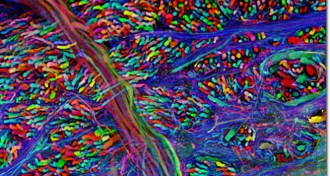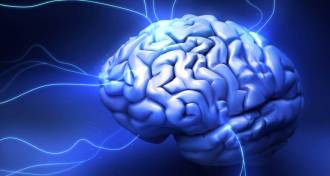Humans
Sign up for our newsletter
We summarize the week's scientific breakthroughs every Thursday.
-
 Health & Medicine
Health & MedicinePregnant women’s immune systems overreact to the flu
A new study offers an exception to the assumption that a pregnant woman’s immune system fades to keep from attacking the growing fetus.
-
 Health & Medicine
Health & MedicineStill waiting on a cure for diabetes
Diabetes diagnoses have skyrocketed in the past 50 years. While there are now better medications and options for control, there is still only hope of a cure.
-
 Neuroscience
NeuroscienceHigh blood sugar could worsen effects of spinal injury
Studies in people and mice suggest reining in blood sugar can improve recovery from a spinal cord injury.
By Nathan Seppa -
 Health & Medicine
Health & MedicineThe sour side of artificial sweeteners
A new study found that saccharin alters the gut microbiome of mice and produces insulin resistance, but it’s not the first to show the sour side of diet drinks.
-
 Neuroscience
NeuroscienceWhite House gives progress report on BRAIN Initiative
More pieces of President Obama’s ambitious BRAIN Initiative announced April 2013 have fallen into place.
-
 Health & Medicine
Health & MedicineEbola case identified in Dallas
The first case of Ebola to be diagnosed in the United States was announced September 30 in Texas.
-
 Archaeology
ArchaeologyAncient stone-tool making method arose multiple times
Hominids in both Africa and Eurasia independently invented a flake-tool technique hundreds of thousands of years ago, countering a long-held idea in archaeology.
By Meghan Rosen -
 Neuroscience
NeuroscienceMighty muscles may stave off depression
Strong muscles protect the brain from stress-induced toxin associated with depression, a study in mice suggests.
-
 Science & Society
Science & SocietySyria’s World Heritage Sites severely damaged by war
Satellite images reveal that five of the country’s six World Heritage Sites have suffered damage and some structures have been completely destroyed.
By Beth Mole -
 Psychology
PsychologyBalancing the excitation and inhibition tightrope in depression
A new study looks at how a balance of positive and negative inputs in the lateral habenula might relate to disappointment and depression.
-
 Health & Medicine
Health & MedicineRecovery time from surgery foretold
Blood samples taken from patients after surgery might reveal who is destined for a quick rebound.
By Nathan Seppa -
 Health & Medicine
Health & MedicineThe debate over spanking is short on science, high on emotion
Spanking to discipline a child sparks heated debate that reflects deep divides in our society. Studies generally show negative effects of spanking, but there are many caveats.